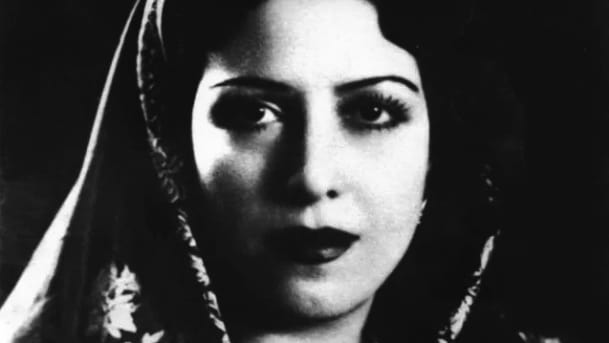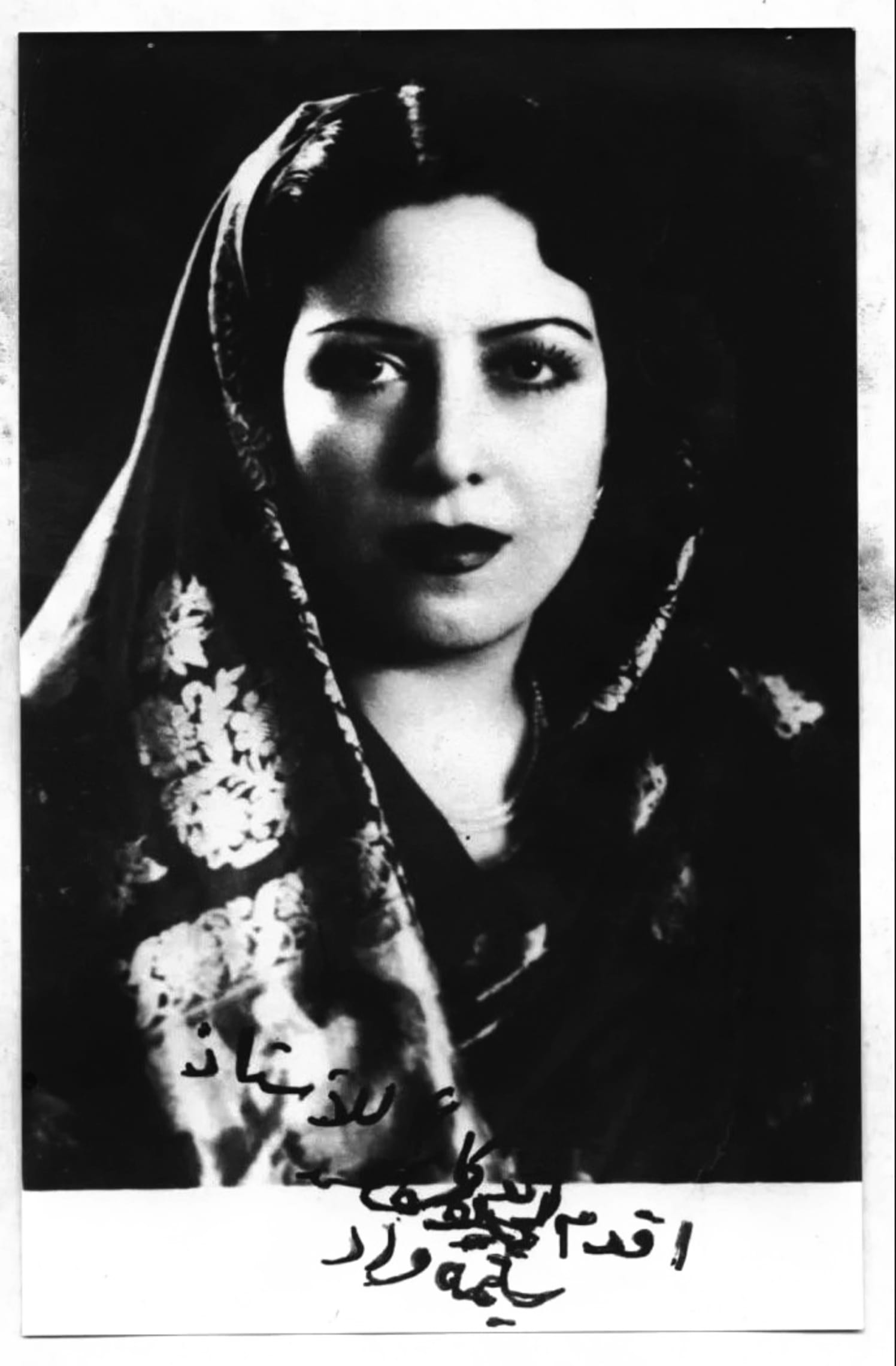Iraq Still Honors This Jewish Star Known as the ‘Voice of Baghdad’
by: Eness Elias
Salima Mourad, a singer who rose to fame in the early 1900s in Iraq – but remained there unlike many Jewish musicians – still strikes a chord today

Salima Mourad takes the stage with her head slightly bowed and a big smile, wearing a sleeveless dress. She always looks stylish; she doesn’t shout it out, it’s simply part of her. She’s hypnotic. You can’t take your eyes off her, in the old film clips. She has a virtuosic voice that she uses in any way she sees fit, spanning a broad vocal range, singing softly and forte. She seems to know exactly what she’s doing. There’s a reason why Mourad, who passed away in 1974, is still considered one of the most famous and admired singers in Iraq.
Last week, a unique tribute was paid to Mourad within the framework of the Jerusalem International Oud Festival. Called “The Voice of Baghdad,” the event took place under the auspices of the city’s Confederation House and featured an impressive group of singers and instrumentalists, as part of a collaboration involving veteran producer and musician Yair Dalal, with artistic direction by Effie Benaya.
The life of Salima Mourad, who was born in 1900, sounds like something out of a Hollywood film: A young Jewish Iraqi woman begins to sing and turns out to be one of the greatest talents in the country and in the entire Arab world. She performs in the most prestigious venues, in cafes, at nightclubs and family parties, and becomes a famous and admired figure, as great as Egyptian singers Umm Kulthum and Laila Mourad – who was also Jewish.
Mourad, dubbed “the voice of Iraq,” recorded a huge number of songs (between 800 and 1,200), mainly in the 1920s and ‘30s, when the Jews dominated the music industry in Iraq. Although during the rule of Saddam Hussein it was forbidden even to mention the names of Jews, after his downfall there was renewed interest in the history and the music of that period, which had brought about a genuine artistic revolution in Iraq.
Today Mourad and other local Jewish musical talents are studied in Iraqi academic institutions, articles are written about them, new musical arrangements are made for their songs, and they are even the topics of television shows. A few years ago Iraqi television broadcast a 14-episode drama series called “Salima,” about Mourad’s life.
In the 1920s and ‘30s, Baghdad was home to an acclaimed music industry, which played a central role in Iraqi culture and Arab culture in general, and was almost entirely dominated by Jews.
“Until about 1920 most of the songs there belonged to the ataba genre, [traditional Iraqi] love songs and dirges, along with Bedouin songs and the traditional Iraqi maqam,” says Dalal, in an interview before the concert, referring to a popular system of melodic modes in Arabic music.
No one was composing modern songs in the country, adds Dalal, 63, who himself has roots in Iraq, “until [Jewish] brothers Saleh and Daoud al-Kuwaiti began to write such songs, and Salima Mourad sang them. And suddenly there was an orchestra of 20 players instead of four – something more powerful, with violins for the first time, with more orchestration.”
At the Congress of Arab Music in Cairo in 1932, Jewish performers showcased modern Iraqi maqam, and in 1936 the Al-Kuwaiti brothers, the most successful composers and instrumentalists in the country at the time, created the Radio Baghdad orchestra, to which they added for the first time instruments such as the ney, a type of flute, and the cello.
“The maqam was sung in cafes, at family celebrations, they would play and sing until morning,” Dalal says.
Until the early 1950s, members of the Chalrey Baghdad ensembles who played modern Iraqi maqam, and eventually expanded into larger orchestras, were exclusively Jewish.
In 2008 the Iraqi maqam was declared by UNESCO as one of its “New Masterpieces of the Oral and Intangible Heritage of Humanity.”
Iraq comes to Israel
One of the best-known stories in the history of the Iraqi Jewish community is the one about the Iraqi prime minister who turned on the radio one day and didn’t hear any music. When he realized that the reason was that it was Yom Kippur, he asked the station manager: “Don’t you have Arab musicians?” “No,” was the simple answer.
One reason why Jews dominated the music scene in Iraq in the early and mid-20th century was the Jewish music school for blind children in Baghdad, which was founded by Yusuf Za’arur, a famous player of the qanun, a string instrument resembling a zither. Many of the students there became successful musicians; some of them immigrated to Israel beginning in the early 1950s, as did Za’arur, and established the Arab Kol Israel (Voice of Israel) Orchestra there.

“The Kuwaitis, the greatest musicians in Iraq, sold eggs at the Hatikva market,” says Dalal, referring to the poor Tel Aviv neighborhood. “I remember their store – I grew up with those people. It’s true, they performed in the Noah Café, with the Israel Broadcasting Authority Orchestra. But it was closed down and they were sent home on early retirement.”
Returning to the subject of Salima Mourad, Dalal notes that unlike many of her fellow Jewish musicians at the time, she decided to remain in Iraq, where “every song she released became a hit. She contributed a great deal to Iraq’s musical culture and to this day one can hear new renditions of her songs – in Iraq and elsewhere.”
In general, a substantial number of noted Iraqi Jewish composers, instrumentalists and singers – among them the Al-Kuwaiti brothers and Za’arur, plus Filfel Gourgy, Ezra Aharon, Yusuf Za’arur, Yaakov al-Ammari, Yosef Shem Tov, Elias Shasha, Salim Shabbat, Yechezkel Katzav and others, considered masters of the maqam – followed the Zionist dream. However upon arrival in Israel, in many cases, they found themselves overwhelmed by the burden of survival and the struggle for basic dignity.
Adds Dalal, “She was an Iraqi first, and then a Jew. She loved her homeland and didn’t want to leave. She felt it was a betrayal: Who would sing in Iraq if not she? The son of Saleh al-Kuwaiti tried to convince her to come to Israel, and told her there was no place for Jews in Iraq. And she asked him: ‘But what will I do there? My audience is here. Here I have millions.’ And the truth is she wouldn’t have had anything to do here.”
Mourad’s career continued to flourish in Baghdad, from the 1930s onward. She received honor and admiration and to this day her influence on Iraqi culture is evident. During her career she also made sure to nurture many young artists.
“Yosef Shem Tov, who played with her from the age of 12, was also in her orchestra,” says Dalal, referring to a well-known Iraqi Israeli talent. “She heard him play and wanted him with her. She was a very generous woman, was nice to everyone around her and always helped people in need.”
One of the singers nurtured by Mourad became her husband, and one of the most famous singers in Iraq, Nazem al-Ghazali. He was a Muslim and she was a Jew, which didn’t seem to matter to her; she was always proud of her heritage.
Dalal: “He was 15 years younger than she, and they fell in love and married. She stayed there together with him and had a glorious career in Iraq and throughout the Arab world, as well as in Paris and London. In 1963 Al-Ghazali died suddenly of cardiac arrest. From that moment she refused to sing and didn’t leave the house. When she died, in 1974, they buried her alongside him in a Muslim cemetery.”
“We lost out,” says Dalal. “The older generation that lived her lost out, but at least the intermediate generation will get to hear these songs on a stage with an orchestra, and not at some party at home.”
The salute to Mourad last week featured experts in Iraqi music, vocalists and instrumentalists alike, starring the Hiba Orchestra, brainchild of Elad Gabai, a singer who plays the qanun and oud. Dalal says he wanted to make the performance as authentic as possible, without using new arrangements of the music, as if the performance were taking place in an auditorium in Baghdad decades ago.
“All this love is coming out of my chest,” he says. “I can’t even define it. I hear and play a lot of music, but suddenly when I hear an Iraqi song I melt. It’s stronger than me.”
[ original here ]



